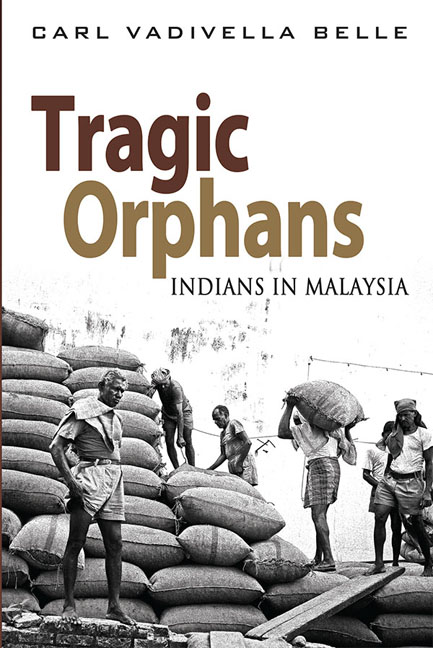Book contents
- Frontmatter
- Contents
- Acknowledgements
- List of Abbreviations
- Introduction
- 1 The Malay Peninsula: Early History, Melaka and the Colonial Setting
- 2 European Colonialism and the Malay Peninsula
- 3 India and the Development of British Ideologies of Empire
- 4 British Governance of Malaya
- 5 Slavery and Indentured Labour
- 6 Indian Indentured Labour in Malaya
- 7 Kangany Labour in Malaya
- 8 Other Indian Immigration
- 9 Indian Political Development to 1941
- 10 The Japanese Invasion, Subhas Chandra Bose and Indian Wartime Nationalism
- 11 The Post–war Period: Reform and Repression: 1945–48
- 12 From Federation to Merdeka
- 13 From Malaya to Malaysia: Singapore, 13 May and the New Economic Policy
- 14 The Mahathir Years: A Changing Malaysian Landscape
- 15 Abdullah Badawi, Islamization, and the Rise of Hindraf
- 16 Najib and 1Malaysia: A New Deal?
- Conclusions
- Bibliography
- Index
16 - Najib and 1Malaysia: A New Deal?
Published online by Cambridge University Press: 06 June 2017
- Frontmatter
- Contents
- Acknowledgements
- List of Abbreviations
- Introduction
- 1 The Malay Peninsula: Early History, Melaka and the Colonial Setting
- 2 European Colonialism and the Malay Peninsula
- 3 India and the Development of British Ideologies of Empire
- 4 British Governance of Malaya
- 5 Slavery and Indentured Labour
- 6 Indian Indentured Labour in Malaya
- 7 Kangany Labour in Malaya
- 8 Other Indian Immigration
- 9 Indian Political Development to 1941
- 10 The Japanese Invasion, Subhas Chandra Bose and Indian Wartime Nationalism
- 11 The Post–war Period: Reform and Repression: 1945–48
- 12 From Federation to Merdeka
- 13 From Malaya to Malaysia: Singapore, 13 May and the New Economic Policy
- 14 The Mahathir Years: A Changing Malaysian Landscape
- 15 Abdullah Badawi, Islamization, and the Rise of Hindraf
- 16 Najib and 1Malaysia: A New Deal?
- Conclusions
- Bibliography
- Index
Summary
Najib Abdul Razak succeeded Abdullah Badawi as Prime Minister on 3 April 2009. The son of former Prime Minister Tun Abdul Razak, Najib entered politics following his father's demise. Najib ascended to the Prime Ministership with a somewhat mixed reputation; he was perceived in some circles as a womanizer who gave his wife far too much public space and a politician prone to occasional race-baiting. However, he was also known as a highly skilled politician and tactician, a clever and patient negotiator with an ability to strike a compromise, and largely free of undue racial and religious baggage. He was also held to be aware of the problems confronting BN and the urgent need for far-reaching reforms. However, it was recognized that Najib had limited room in which to manoeuvre, and that deeply entrenched and vested interests would oppose any overhaul of a system dominated by networks of patronage and the imperatives of “race”. The rise of the Malay chauvinist body Perkasa, with its extremist agenda, and linked to Mahathir and Mahathir loyalists within UMNO, was cited as indicative of the forces arraigned against meaningful reform.
Following his appointment as Prime Minister Najib introduced a new political philosophy known as “1Malaysia”. This approach appeared to represent an attempt to rebuild the political and social consensus that had prevailed in pre-Mahathir Malaysia. Najib was aware that certain groups (for example, Indians and the Orang Asli) had been marginalized from the main body politick, that their concerns were not being addressed, and that there was a need for greater inclusivity in formulating public policy. The election of 8 March 2008 had demonstrated the need to address these concerns.
1Malaysia, opposed by large sections of UMNO, suggested a fresh and more dynamic approach to the politics of ethnicity, and as with Mahathir's Bangsa Malaysia it generated considerable enthusiasm among those yearning for a Malaysian identity which ranged beyond the primary considerations of race/communalism.
Najib introduced a range of reforms, including further liberalization of the NEP (however without significantly diluting the affirmative action provisions of the policy), and financial reforms designed to attract foreign investment. He oversighted the repeal of the hated Internal Security Act and removed other colonial-era restrictions designed to limit freedom of speech and political association.
- Type
- Chapter
- Information
- Tragic OrphansIndians in Malaysia, pp. 426 - 449Publisher: ISEAS–Yusof Ishak InstitutePrint publication year: 2014

